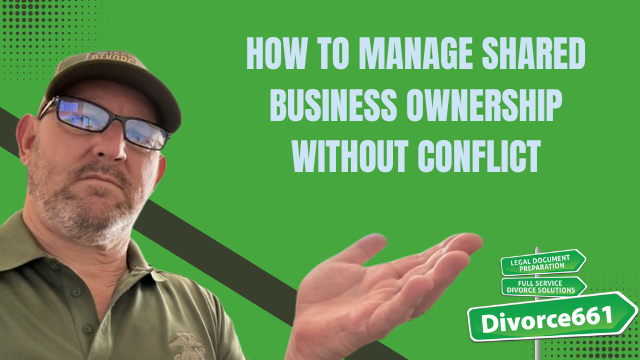How to Manage Shared Business Ownership Without Conflict
Divorce is already a challenging and emotional process, but when you and your ex-spouse share ownership of a business, the complexities multiply. I’m Tim Blankenship from Divorce661, and I’ve helped countless couples navigate these delicate situations. Whether your business is your primary income source or a side venture, managing co-ownership post-divorce requires a clear plan, mutual respect, and strong legal protections to avoid ongoing conflict.
Deciding Whether to Continue Co-Owning or Buy Out
The first and most crucial step is to determine if both parties want to remain involved in the business after the divorce. In many cases, one spouse opts to buy out the other’s share, which provides a clean break and minimizes future conflict.
Here’s how that typically works:
- Business Valuation: A professional appraiser assesses the business’s value to ensure fairness.
- Negotiating a Payout: Once valued, the parties negotiate a buyout price that compensates the departing owner.
- Structured Payment Plans: If a lump-sum buyout isn’t immediately feasible, you can agree on a payment plan over time.
Buying out a partner after divorce can provide peace of mind and simplify post-divorce financial planning.
Creating a Post-Divorce Business Agreement for Co-Ownership
If you decide to continue co-owning the business, having a detailed partnership or operating agreement is absolutely essential. This document serves as the roadmap for your ongoing business relationship, laying out clear expectations and boundaries.
Key elements to include:
- Roles and Responsibilities: Define who handles what in daily operations to avoid overlap and confusion.
- Decision-Making Authority: Clarify who has the final say on critical business decisions to prevent deadlocks.
- Exit Strategy: Outline what happens if either party wants to leave the business in the future.
- Communication Boundaries: Set guidelines for professional communication to keep personal feelings separate.
- Dispute Resolution: Establish a process for resolving disagreements before they escalate into legal battles.
Additionally, your divorce judgment should specify how business income and profits will be handled. This includes:
- How income is reported for tax purposes.
- Whether one party owes the other a portion of future profits.
- Maintaining separate personal and business finances to avoid misunderstandings or resentment.
Real Client Example: Making Co-Ownership Work Post-Divorce
Recently, I worked with a couple who co-owned a thriving marketing agency. They wanted to remain business partners but were understandably concerned about how their personal split might affect their company’s future.
We created a comprehensive post-divorce business agreement that clarified:
- Ownership percentages
- Decision-making responsibilities
- Profit distribution
This agreement allowed them to maintain a professional relationship with minimal friction, ensuring the business stayed strong even as their personal relationship changed.
Why a Clear, Enforceable Plan Matters
At Divorce661, we believe that divorce is about more than just legal paperwork—it’s about protecting your future. When a shared business is involved, it’s critical to have a plan that is both clear and enforceable. This helps prevent ongoing financial disputes and emotional stress, allowing both parties to focus on their livelihood and peace of mind.
If you and your ex share a business and want to explore options—whether that’s continuing co-ownership or pursuing a buyout—professional guidance is key. We offer flat-fee divorce services that cover business ownership issues, drafting buyout agreements, and creating partnership agreements tailored to your unique situation.
Protect Your Business and Your Sanity
Managing shared business ownership after divorce is challenging, but it doesn’t have to be a source of constant conflict. With the right structure, clear communication, and legal protections, you can protect your income and maintain a professional relationship that benefits everyone involved.
For those navigating this complex terrain, I invite you to schedule a free consultation at Divorce661.com. We’ll help you build a solid plan that safeguards your business, your finances, and your peace of mind.
Final Thoughts
Divorce and business ownership don’t have to be mutually exclusive. Whether you choose to part ways with your ex in business or continue working together, the key is clarity. Define your roles, responsibilities, profit sharing, and dispute resolution upfront. This approach not only protects your business but also helps you move forward with confidence and less stress.
If you’ve ever worked with a former partner, you know how tricky it can be. Share your experiences and insights—you might help someone else facing the same challenge.

